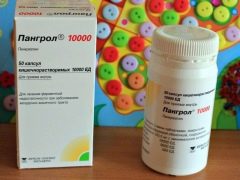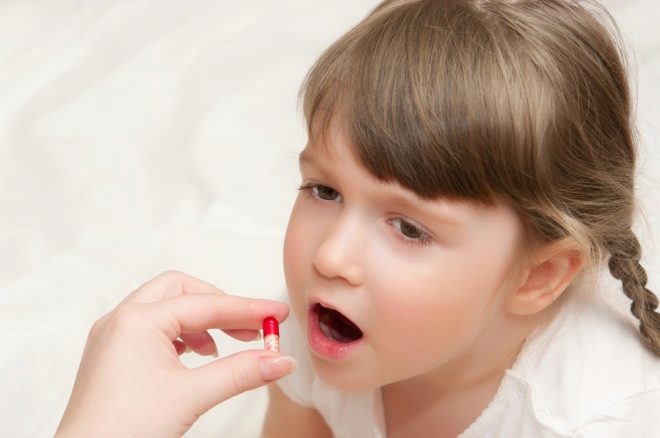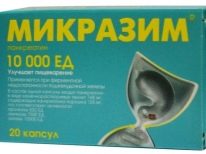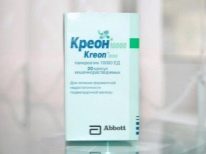"Pangrol 10 000" for children: instructions for use
"Pangrol 10000" from the well-known company "Berlin-Chemie" is an enzyme agent that is in demand in some diseases of the digestive system. It is most often prescribed for adults with chronic pancreatitis, but is sometimes prescribed for children.
In order for such a medicine to really help improve digestion, before using it, parents should learn more about Pangrol's effect, indications for its use and possible adverse effects on the children's body.
Dosage form and composition
"Pangrol 10000" is represented by capsules that are sold in plastic bottles of 20, 50 or 100 pieces. They have the shape of a cylinder with rounded ends, size No. 2, an orange body and a greenish-yellow cap of gelatin. Inside the capsule are cylindrical tiny beige tablets, the shell of which dissolves in the intestine.
The number in the name of the medicine indicates the dosage of the main ingredient of “Pangrol” - Pancreatin, and at the same time shows how many units of lipase are in one capsule. In addition to this enzyme, the drug also includes 9 thousand IU of amylase, as well as proteases in the amount of 500 U. Among the auxiliary compounds of the drug are castor oil, MCC, simethicone emulsion, dyes, croscarmellose sodium and other substances.
It should also be noted that "Pangrol" is produced in a higher dosage. Pharmacies can meet capsules containing 25,000 IU of lipase. They also have an orange-green shell, inside which there are round mini-tablets, but the size of the capsule itself is larger (# 0). This tool, called "Pangrol 25000", is chosen for older children who need large doses of enzymes.
Operating principle
Pancreatin present in the capsules is extracted from the pancreas glands of pigs and contains enzymes that are necessary for the normal digestion of carbohydrates, fats and protein compounds in food. The use of "Pangrol" helps the pancreas, if its function is impaired, and also helps to normalize digestion and, in general, has a positive effect on the digestive tract.
The capsule shell made of gelatin is destroyed in the stomach, but the coating of the mini-tablets withstands the action of hydrochloric acid. This structure of the drug allows you to protect the enzymes from inactivation of gastric juice. Since the tablets are small, they are evenly mixed with food and distributed in the intestinal contents. As soon as they enter the small intestine, enzymes are released and pancreatin is involved in digestion.
Indications
"Pangrol 10000" is used in various lesions of the pancreas, when the function of such an organ is disturbed, for example, if the pancreas is inflamed, a tumor process is detected, it is partially or completely removed, or the organs of the digestive tract are irradiated. The drug is also often prescribed for the treatment of cystic fibrosis.
In addition, it can be used to eliminate the temporary lack of enzymes caused by such problems:
- overeating;
- acute intestinal infection;
- taking fatty and fried foods;
- functional digestive disorders (non-infectious diarrhea);
- the use of excess vegetable products that are difficult to digest;
- irritable bowel syndrome.
Another reason for the use of "Pangrol" can be preparation for the examination of the abdominal cavity - capsules are prescribed to patients who are to undergo ultrasound or x-rays. Doctors can also include such an enzyme agent in the treatment of dysbiosis, lactase deficiency, atopic dermatitis, and other problems. Capsules are also shown to patients who recover from an infectious disease or surgery so that the food in their body is better absorbed.
At what age is children prescribed?
There are no age limits for the use of capsules, so the drug can be prescribed even for a newborn.
However, the use of infants and older children without prior consultation with the doctor is not recommended, because there are some limitations for the treatment with Pangrol.
Contraindications
Like other enzymes, “Pangrol” should not be taken in case of acute inflammation of the pancreas or in case of exacerbation of chronic pancreatitis. Capsules are also contraindicated in case of hypersensitivity to pancreatin or any inactive component.
Side effects
Due to taking Pangrol, a child may develop an allergic rash, bloating, loose stools, nausea, constipation, or other unpleasant symptoms. In such a situation, you need to report a side effect to the doctor to correct the treatment.
Instructions for use
The selection of the “Pangrol 10000” dose for a particular child should be individualized, since it is influenced by the disease itself and the patient’s diet (the diet prescribed by the doctor). On average, one kilogram of baby weight for each meal requires 500-1000 IU of lipase.
If crumbs have cystic fibrosis, the dosage is also selected based on age, weight, stool analysis and diet composition. At the same time, it is not recommended to exceed the dose of 10 thousand lipase units per kilogram of body weight per day.
Terms of sale and storage
"Pangrol 10000" refers to non-prescription drugs, so there are no difficulties with buying it, but the advice of a specialist to determine the required daily dose and treatment regimen is necessary. The average price of a jar with 20 capsules is 250-260 rubles.
The shelf life of the drug is 2 years and is listed on the box. Until the date marked on the package, the product should be stored in a place where a small child cannot find the capsules. The optimum storage temperature is not higher than 25 degrees Celsius.
Reviews
More than 90% of the reviews left about the "Pangrol 10000" - positive. In them such capsules are called effective and more affordable in comparison with analogues. According to moms, the medicine is quite convenient to use, it is well tolerated and has a rapid healing effect.
In the majority of reviews, no drawbacks are noted at Pangrol. Only occasionally there are complaints about the difficulties of use in infants, and some parents still call such a drug expensive.
Analogs
If it is not possible to give the child "Pangrol 10000", it can be replaced by another enzyme preparation containing pancreatin. Such analogues include such funds.
- "Mezim Forte". Such medicine is produced by the Russian company "Berlin-Pharma" in the form of tablets. They have a shell, and each tablet is the source of 3500 IU of lipase. In addition, there are tablets with a dosage of 10 thousand ("Mezim Forte 10,000") and 20 thousand ("Mezim 20,000"), which are appointed from 3 years.
- "Creon". The analogue of “Pangrol 10000” will be the capsules “Kreon 10,000”, but such German medicine is also presented with a higher content of lipase in one capsule - 25 and 40 thousand. Babies can be given "Kreon Micro", since it is more convenient to dose such granules for the smallest patients.
- Panzinorm 10000. Each capsule of this drug from the company KRKA contains the same dosage of enzymes as in Pangrolet 10,000, and this drug costs a little less.
- Pancreatin Forte. This is another affordable analogue from the Russian company Biosintez.The amount of lipase in one such tablet is at least 3850 U, but this preparation is not given to children under 3 years old.
- Hermital. These capsules of the German manufacturer are presented in a dosage of 10,000, which allows replacing the “Pangrol”. In addition, they are released in a dose of 25,000 and 36,000 lipase ED.
- "Penzital". In one such tablet, the shell contains 6000 PIECES of lipase. The drug is made in India and is quite cheap.
- "Mikrasim". Such capsules from the Russian company AVVA RUS are presented in the same dosages as Pangrol. They contain pellets that dissolve in the small intestine.
All these and other means are allowed in childhood, but should be used in babies only as prescribed by a specialist. It is not recommended to give the child enzymes without consulting with a doctor.
Dr. Komarovsky will tell you about whether enzymes are necessary for dysbacteriosis in the next video.





























